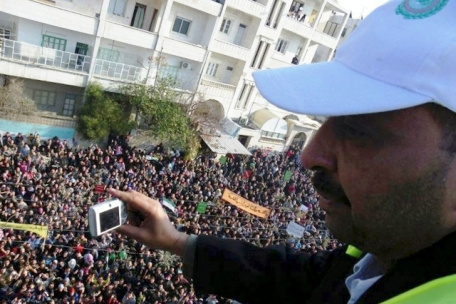Observers’ Entrance Benefits Assad

IRD: It is for the first time that the Arab League involves itself in a case of human rights. What is the process through which the observers of the league to Syria go?
MN: In fact, as it is for the first time this happens, there is no certain information about the process. It only can be stated that this delegation is visiting Syria subsequent to the meeting of the ministers of foreign affairs of the Arab League members, whose report, logically, will be delivered to the meeting. In the next phases, the result of the observation may be submitted to the heads of the league for making a decision in the end.
IRD: What impact has the visit of the observers to Syria had on violence and slaughter?
MN: As there is no neutral source providing people with true information, there is no information available as to whether the delegation’s visit has impacted the number of the victims in Syria’s events. In the past, the number of victims has been announced by opponent sources and the Western media, neither of which has been neutral in announcing the number of killed. As a result, it cannot be determined whether the visit has had any impact.
It seems that both sides, considering that the delegation provides evidence about the performance of the system and the protestors, are forced to keep a limit in exerting violence, while no sources have certified or rejected the issue.
IRD: Is it probable that the observers’ delegation plays an international role, submitting their reports to the UN or the Security Council?
MN: Currently, the Syria’s case is the hot topic in the Arab League. It depends on the circumstance. The ones in the Arab League who put pressure on the Syrian political system for reforms are in relationships with trans-regional powers in Europe and the US. Thus, it is probable that they will use any opportunity to submit Syria’s case to the Security Council, but in fact, considering the status quo, neither the Arab League could take any measure against Syria-- including execution of the approved boycotts-- nor the Security Council, considering the governing power relations and the support of Russia and China for Syria, could make an effective decision. Therefore, Syrian information is exchanged between the Arab League and the European countries and the US.
IRD: How may the observers visiting Syria be affected by the foreign powers? How is the committee’s independence defined?
MN: The issue of dispatching the observers has been agreed by Syria and the Arab League and trust governs their decision, as the performance of the delegation somehow confirms this. The committee has not submitted any reports so far and no bias is seen in their actions, an issue that may benefit the Syrian system since the media, Western or Arabic outside the country get their information from the protestors, following an anti-regime policy.
The presence of the delegation may modify the issue, because it gives a more detailed and true image of the existing struggle in Syria. Namely, the observers to Syria witnessing the armed forces and the protestors set up some barricades has now recognized that the military operations are bilateral and both sides commit violence. Therefore, in practice, the visit of the delegation to Damascus benefitted the ruling system of the country politically and in terms of media, an issue that has created balance in the media and a reflection of realities in Syria.
IRD: What outcomes may the visit have?
MN: It is possible that the majority present in the Arab League will argue that there is a need to have serious changes in Syria. Therefore, it cannot be predicted whether the delegation will submit neutral reports. However, it is an opportunity for Syrians to resist foreign intervention, while the public opinion of the Arab world, the one in Syria and the Syrian protesters are all against any involvement. Only a group of the protestors in pursuit of reforms in Syria at any expense defend the issue, but those who are worried about the future of the country prefer to make changes without any foreign intervention, but via domestic reforms. Consequently, this issue provided an opportunity for the government, the protestors and also the Arab world to take positive steps, while the result is still not certain.

